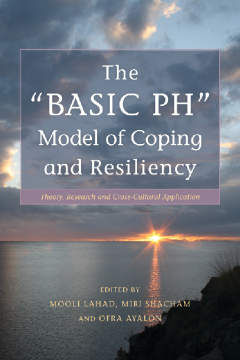
BOOK
The "BASIC Ph" Model of Coping and Resiliency
Dmitry Leykin | Ljiljana Krkeljic | Ruvie Rogel | Mooli Lahad | Yossi Lev | Shulamit Niv | Judith Spanglet | Naomi Hadari | Ofra Ayalon | Gina Lugovic | Moshe U. Farchi | Dorit Elmaliach | Meirav Tal-Margalit | Yovav Eshet | Nira Kaplansky | Nevenka Pavlicic | Miri Shacham | Yehuda Shacham
(2012)
Additional Information
Book Details
Abstract
The “BASIC Ph” model of coping and resiliency, developed by Prof. Mooli Lahad and Dr. Ofra Ayalon, was the first to describe coping as an on-going effort to manage life challenges. This is the first book to be published on this world-renowned approach, widely used as an effective resiliency assessment, intervention, and recovery model.
Underpinning the model is the suggestion that every person has internal powers, or coping resources, which can be mobilized in stressful situations; the effort to survive coming from a healthy rather than a pathological instinct. The categorization of these coping resources gives the model its name: Belief, Affect, Social, Imagination, Cognition, Physical. This edited volume outlines the theory behind the “BASIC Ph” approach, presents practice-based and research-based interventions and explains their application during and in the wake of both natural and man-made disasters. With wide-ranging chapters from authoritative contributors, the book shows how the “BASIC Ph” model can be successfully applied in family, community, education, health, and business settings.
This will be an invaluable text for professionals, academics, and students with an interest in trauma and coping with crisis and disaster.
This is an excellent book and essential reading for clinicians and practitioners of all kinds, including play and creative arts therapists. It brings together theory, application and research in a comprehensive manual. The language is accessible but rigorous, and examples of practice bring the text to life and help the reader to live the resilience factor. This book will be in demand for evaluation of 'evidence based-practice' with suffering populations, whether children or adults. It certainly provides an illuminating experience for the reader.
Professor Sue Jennings, PhD, Visiting Fellow Leeds Metropolitan University, Churchill Fellow 2012-2013 'Arts and Older People'
The book descries the usefulness of psychotherapy. it explains that although this form of therapy uses different tools that explore a person's processes an insight, both the preventative model and psychotherapy have equal merit and can achieve similar outcomes... This book helps the reader to understand that people have different belief systems that inform their thinking and behaviours and goes on to compare different coping strategies adopted by diverse peoples and populations... The book uses research, tables, diagrams, photographs and frameworks to enable the reader to visualise the situations of a number of crisis lade communities all over the wold. Case studies bring vividly to life the stories of the most difficult environments and how they cope. The book explains how by applying the BACIS Ph model communities can be helped to build their resiliency and cope ore healthily.
Hilary Schultess-Young, Independent Social Worker
Professional Social Work
This volume's importance is that it opens theory to practice for the study, understanding, and promotion of resilience. We still know little about protecting and developing resilience and it is essential that we be open to an array of models that we develop, test, and refine. This volume offers both clinicians and researchers critical approaches for supporting and fostering people's strengths who are confronted with great adversity. We are at the beginning of this journey that will ultimately be one of mental health's fundamental contributions to humankind.
Stevan E. Hobfoll, PhD, The Judd and Marjorie Weinberg Presidential Professor and Chair, Behavioral Sciences, RUSH University Medical Center, Chicago, Illinois
